Authors
In search of the spirit
13 November 2009 | Authors, Essays, Non-fiction, On writing and not writing

In this series, Finnish authors ponder their trade. Tuomas Kyrö – author of the extraordinary novelistic chronicle of the birth of capitalism Benjamin Kivi, which you can read here – found himself lost for words. Liberation came with the realisation that, unlike in television, in books it is the writer, and the reader, who are in charge, and the only limits are those of the human imagination
In May 2009, after a year of writing, I held in my hand the manuscript of a novel whose plot and characters were complete. There was a subject, theme and the occasional good passage, but something was badly wrong.
When I swapped roles, writer for reader, I realised that my text did not touch the skin, and certainly did not get under the skin. I had wanted do more than raise a smile; I had thought I was writing a book that would make its readers want to turn the page, I had wanted to provoke, to cause laughter and even perhaps tears. Now all that my text provoked in the reader – me – was embarrassment and boredom.
What was wrong? More…
Veikko Huovinen (1927–2009) in memoriam
23 October 2009 | Authors, In the news
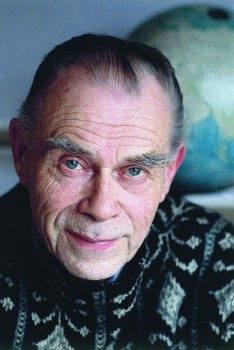
Veikko Huovinen (1927–2009). – Photo: Irmeli Jung /WSOY
Author Veikko Huovinen died on 4 October at his home in Sotkamo, in northern Finland, at the age of 82.
Huovinen was a graduate of the forest research programme at Helsinki University and worked for a period as a forest ranger. In the 1950s he began working as a full-time writer after his first novel, Havukka-ahon ajattelija (‘The thinker of Havukka-aho’, 1952), achieved great success.
Havukka-ahon ajattelija is the story of a stubbornly ruminative backwoods philosopher who ponders natural phenomena and the great political turning points that he hears about on the radio. The novel has been translated into six languages.
The soil that Huovinen’s works spring from is his northern community surrounded by deep forest, and his characters are modelled on its inhabitants: a self-sufficient business owner, a vagrant rascal, an ill-tempered hermit. They withdraw into the shelter of their homes, where the arctic winds and the evil of the world can’t reach them. Such humoresques might bring to mind Mark Twain or the early works of Nikolai Gogol. More…
Survival games
9 October 2009 | Authors, Reviews
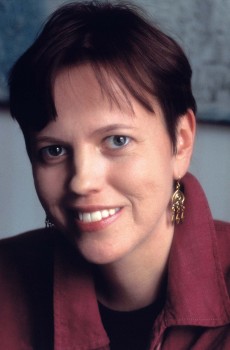
Sari Malkamäki. - Photo: Irmeli Jung
Fathers and sons, mothers and daughters in Sari Malkamäki’s new short stories
The relationship between parents and children is the central theme of Sari Malkamäki’s fifteen new short stories. She published her first collection in 1994; in Jälkikasvu (‘Offspring’, Otava, 2009), her tenth book, the few stories in which children don’t appear nevertheless allude to childhood experiences or to a child who sets the narrative in motion.
The point of view may be that of the child or of the parent, the focus of description some moment that forms a turning point in the characters’ circumstances, or even in their lives. Malkamäki’s children are often touchingly resourceful and brave, even when their adults fail them. More…
In Darwin’s garden
3 September 2009 | Authors, Interviews
Interview with Kristina Carlson, author of Herra Darwinin puutarhuri(‘Mr Darwin’s gardener’, 2009)
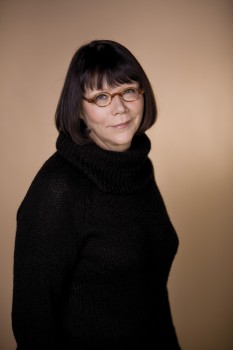
Kristina Carlson. Photo: Tommi Tuomi
Time: late 1870s. November. Place: the village of Downe, Kent, England. Villagers gather in the church on a rainy Sunday. Thomas Davies stays at home with his two children.
After the death of his wife, Thomas has been unable to get over his grief and anxiety. The villagers don’t approve of Thomas’s way of living – he isn’t sociable, keeps to himself, doesn’t go to church, and reads too many books. His employer is Charles Darwin: a famous – or notorious – man who writes too many books. ‘Mr Darwin lives here, and atheism is a worse threat than in the neighbouring villages,’ says Stuart Wilkes, voicing the views of the villagers.
Thomas is the central character in Kristina Carlson’s new novel, Herra Darwinin puutarhuri (‘Mr Darwin’s gardener’, Otava, 2009). Ten years ago her previous novel, Maan ääreen (‘To the end of the earth’), set in 19th-century Siberia, won the Finlandia Prize for Fiction.
As 2009 is the second centenary of Charles Darwin, the author of On the Origin of Species (published in 1859), the first question that comes to mind is whether this is coincidental or not… More…
A sweep is as lucky as lucky can be
27 August 2009 | Authors, Reviews
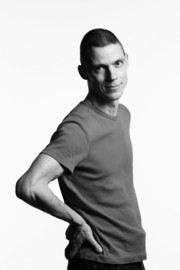
Jari Järvelä. Photo: Ville Palonen
The heroine of Jari Järvelä’s new novel begins telling the story of her life from inside an oven, beneath which a murderer is stoking a fire: a gripping start.
The reader of Mistä on mustat tytöt tehty? (‘What are black girls made of?’) has to wait until the end of the novel to find out what happens to the captive female chimney sweep, Katariina or ‘Rööri’ (‘Pipey’). In those moments in the oven, Pipey’s life flashes before her eyes.
In his previous novels, Jari Järvelä (born 1966) has concentrated on exploring people on the margins of Finnish history; rather than portraying the lives of significant figures, he chooses instead to depict everyday people and their day-to-day lives.
In his recent trilogy, Järvelä gave an account of the years between Finland’s independence in 1917 and the beginning of the Second World War. (The final part of this trilogy, Kansallismaisema [‘National landscape’, 2006] was featured in Books from Finland 4/2006). Since 1995 his output has included seven novels, collections of short stories and radio plays. More…
In praise of melancholy
28 May 2009 | Authors, Essays, Non-fiction, On writing and not writing

In this series, Finnish authors ponder the difficulties of their profession. Sirpa Kähkönen, author of six novels, gives an account of going unseen – the painful initiation, triggered by the lukewarm reception of one of her books, of a more mature and profound phase in her life as a creative writer
I found myself in a temporary but intense period of creative crisis in the spring of 2006. The crisis was expressed outwardly in the classic manner – as an emptiness, a desertification. Suddenly I was unable to get to the place between dream and reality where an artist operates. Something was missing from my writing; the spark, the vibration, the lifeblood. More…
Desire versus apathy
14 May 2009 | Authors, Reviews
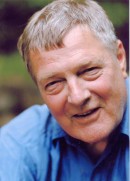
Claes Andersson. - Photo: Johan Bargum.
Bror Rönnholm on the poetry of Claes Andersson
‘Use it or lose it,’ writes Claes Andersson in his latest collection of poetry, Lust (‘Desire’, Söderström, 2008). The collection deals not only with the flesh and bones of things, but with thoughts and emotions: ‘First you are unfeeling then cold / then insensible’. And just like hate, love and desire, you will lose friendship too if you don’t use it.
Perhaps after 28 books and an active life as a psychiatrist, a politician and a jazz pianist, Claes Andersson (born 1937) has reached the age at which he realises that desire, in the broadest sense of the word, is not a self-evident, constantly regenerating spring, but something to nurture and to fight for. It goes without saying that an older person’s perspective and the proximity of death run through the collection like an active undercurrent. Despite the title there is also room for plenty of apathy in this collection. Or, rather, desire also has its darker, complicated sides. More…
Sisters beneath the skin — the letters of Edith Södergran and Hagar Olsson
11 February 2009 | Articles, Authors, Extracts
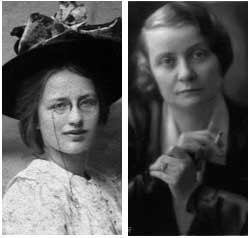
Edith Södergran and Hagar Olsson. – Photos: Svenska litteratursällskapet i Finland, Åbo Akademis bildsamlingar.
Almost one hundred years ago, a small Karelian village close to St Petersburg, near the Finno-Russian border, saw the birth of a fearless new form of modern poetry.
The Finland-Swedish poet Edith Södergran (1892–1923) began writing her burning lines inspired by Friedrich Nietzsche’s ideal of the new man and his philosophy of creativity. Södergrans’ poems were free of any traditional pattern and full of strong images. Her work, which ran to six collections of poems, later achieved classic status in the modernist traditon that she presaged.
For the love of fables
1 February 2009 | Authors, Reviews
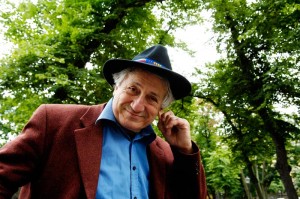 What do Jesus, Aesop and the writer Daniel Katz all have in common? The key to the mystery lies in the second of the three names: fables are a part of all their works. Jesus spoke famously in (animal) metaphors, and the Greek writer Aesop is regarded as the father of the genre.
What do Jesus, Aesop and the writer Daniel Katz all have in common? The key to the mystery lies in the second of the three names: fables are a part of all their works. Jesus spoke famously in (animal) metaphors, and the Greek writer Aesop is regarded as the father of the genre.
Daniel Katz’s 13th book, Berberileijonan rakkaus (‘The love of the Berber lion’, WSOY, 2008), is playfully aware of its ancient roots. In fact, his (post)modern collection of stories is, on every level, a conscious non-Finnish meta-fiction depicting the very process of writing.
More…
Language and tongue
Issue 4/2008 | Archives online, Authors
Kristina Carlson on Maritta Lintunen’s short stories
‘What does he think I’ve told him? And how? Shell fragments took my tongue and half my jaw.’ These are the thoughts of a war veteran on hearing his sons speech of exaggerated praise for the heroic deeds of the war.
Maritta Lintunen is a music teacher by education. She has published novels, collections of short stories and poetry. Many of the characters in Lintunen’s short stories are bystanders in their own lives, and the situation in the title story ofthe collection Tapaus Sidoroff (‘The Sidoroff case’, WSOY, 2008) is particularly ironic. Lintunen turns the typical Finnish situation on its head: veterans want to reminisce, but the young cant be bothered to listen. The father sits at the festive hall like a crippled monument to heroism, and wonders why his son didn’t become a hippie like his peers and oppose the Vietnam War. But no: the son becomes an army officer and a public speaker, and the father is made a reluctant human model. The father’s ruminations run parallel with his son’s fiery speech. His war experiences are made into a common heroic interpretation of history – and they are false. But how can a man with half a mouth dispute it? More…
A feminist and a dreamer
Issue 4/2008 | Archives online, Authors
The Swedish-speaking minority culture of Finland provided an unlikely crucible for the literary modernism that was to reshape western poetry in the early 20th century. Clas Zilliacus introduces the life, work and times of Hagar Olsson (1893–1978), writer and feminist
Finland-Swedish modernism – the most cherished ‘ism’ and period in Finland-Swedish literature – began in 1916, the year in which both Edith Södergran and Hagar Olsson published their first books: a collection of poems and a novel, respectively.
The principal feature of Södergran’s poetry is a tautly compressed treatment of poetic symbolism; her poems could cross the solar system, but were also able to find the key to life in the raspberry patch. The literary style of Hagar Olsson (1893–1978) had many more uses, but none of them were poetic. The two women became close friends in 1919 but, due to the distance between the poet’s home in Karelia and the critic’s in Helsinki as well as to Södergran’s illness and poverty, they mostly communicated by letters. Their correspondence: from 1919 to 1923, was published more than thirty years after Södergrans death from tuberculosis (1923) in the book Ediths brev (‘Edith’s letters’, 1955). More…
Fairy tales updated
30 December 2008 | Authors, Reviews
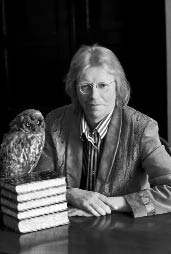
Jukka Itkonen. Photo: Irmeli Jung.
Päivi Heikkilä-Halttunen on Jukka Itkonen’s quirky fables
In Jukka Itkonen’s collection of fables for children, Sorsa norsun räätälinä (‘The mallard as tailor to the elephant’, Otava, 2008) the plots and heroes of traditional fairy tales are turned on their heads. This kind of parody drawing on old-time folktales has been introduced to Finnish readers by translations of the British author Babette Cole and her feminist-flavoured picture books. More…
In memoriam Paavo Haavikko 1931–2008
30 December 2008 | Authors, In the news
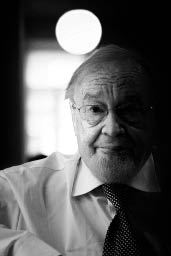
Paavo Haavikko. Photo: Kai Widell.
The poet, writer, playwright and publisher Paavo Haavikko died in Helsinki in October, at the age of 77.
Haavikko was one of Finland’s most internationally recognised writers, and his success was helped by many prominent poets’ interest in his lyric poetry. His work was translated by Anselm Hollo and Herbert Lomas (English), Manfred Peter Hein (German), Bo Carpelan (Swedish), and Gabriel Rebourcet (French), among others.
Haavikko debuted in 1951 as a lyric modernist who broke through all of modernism’s barriers. He was a master of intoxicating lyricism, and an intellectually discerning storyteller of general truths in his narrative poems. His collections Talvipalatsi (‘Winter palace’, 1959) and Puut, kaikki heidän vihreytensä (‘The trees, all their green’, 1966), in particular, have achieved the status of classics. More…
A hole in the landscape
Issue 3/2008 | Archives online, Authors

Tomi Kontio. Photo: Heini Lehväslaiho
Jukka Koskelainen on Tomi Kontio’s new poems
Tomi Kontio (born I966) has often depicted suburban life both scabrously and romantically, a rather rare combination in Finnish literature. Poetically heightened language is not usually connected with apartment-block districts, but Kontio has the ability to zoom from the milk carton on the kitchen table to the Milky Way. It has made him one of Finland’s most read poets.
In his debut volume, Tanssisalitaivaan alla (‘Under the ballroom sky’, 1993), Kontio had a tendency towards a freewheeling, painterly imagery. In Vaaksan päässä taivaasta (‘A span from heaven’, 2006), the volume before the present one, he wrote a series of short narratives about the hard side of living on a housing estate. Kontio has also published children’s books, among other things, and was awarded the Finlandia Junior Prize for his novel Keväällä isä sai siivet (‘In the spring father grew wings’, Tammi, 2000). More…
An adventurer in history
Issue 3/2008 | Archives online, Authors
The most popular Finnish writer of the 20th century, Mika Waltari (1908–1979), was a prolific author whose historical novels were best sellers in other languages, too. Sinuhe egyptiläinen, The Egyptian, (1945) was filmed in 1950s Hollywood. In these extracts from her book on Waltari, the Czech translator and publisher Markéta Hejkalova takes a look at his life and his famous novels.
For Mika Waltari, but not just for him, the early 1920s ushered in a beautiful, intoxicating and youthful world that promised freedom, love and adventure after the horrors of the First World War. And yet the writers of the 1920s are sometimes referred to as a lost generation – maybe because the world failed to fulfil all their dreams; ideal love no longer existed, and they were all too often aware of the dark side of free love: syphilis, still an incurable disease at that time.
-
Currently browsing
Interviews with Finnish authors and introductions to their work
-
RSS feed
Subscribe to RSS feed for Authors
-
List of authors and contributors
- Abu-Hanna, Umayya
- Ågren, Gösta
- Aho, Hannu
- Aho, Juhani
- Aho, Claire & Westö, Kjell
- Ahola, Suvi
- Ahti, Risto
- Ahtola-Moorhouse, Leena
- Ahvenjärvi, Juhani
- Ala-Harja, Riikka
- Alftan, Maija
- Alhoniemi, Pirkko
- Anderson, John
- Andersson, Claes
- Andersson, Jan-Erik
- Andtbacka, Ralf
- Anhava, Tuomas
- Antas, Maria
- Apunen, Matti
- Aro, Tuuve
- Aronpuro, Kari
- Autio, Milla
- Bargum, Johan
- Bargum, Marianne
- Barrett, David
- Binham, Philip
- Björling, Gunnar
- Blau DuPlessis, Rachel
- Bolgár, Mirja
- Boucht, Birgitta
- Bremer, Caj
- Bremer, Stefan
- Brotherus, Elina & Ala-Harja, Riikka
- Byggmästar, Eva-Stina
- Canth, Minna
- Carlson, Kristina
- Carpelan, Bo
- Chan, Stephen
- Chorell, Walentin
- Diktonius, Elmer
- Ekman, Michel
- Ekroos, Anna-Leena
- Enckell, Agneta
- Enckell, Martin
- Enqvist, Kari
- Envall, Markku
- Eskola, Kanerva
- Fagerholm, Monika
- Flint, Austin
- Forsblom, Harry
- Forsblom, Sabine
- Forsström, Tua
- Gothóni, Maris
- Granö, Veli
- Gripenberg, Catharina
- Gröndahl, Satu
- Grünthal, Satu
- Haanpää, Pentti
- Haapala, Vesa
- Haasjoki, Pauliina
- Haatanen, Kalle
- Haavikko, Paavo
- Hämäläinen, Helvi
- Hämäläinen, Timo
- Hännikäinen, Timo
- Hänninen, Anne
- Hannula, Risto
- Harju, Timo
- Härkönen, Leena
- Harmaja, Saima
- Hassinen, Pirjo
- Havukainen, Aino & Toivonen, Sami
- Hawkins, Hildi
- Heikkilä-Halttunen, Päivi
- Heikkonen, Olli
- Heinimäki, Jaakko
- Hejkalová, Markéta
- Hellaakoski, Aaro
- Hertzberg, Fredrik
- Hiidenheimo, Silja
- Hiltunen, Eija Irene
- Hökkä, Tuula
- Holappa, Pentti
- Hollo, Anselm
- Holmström, Johanna
- Honkala, Juha
- Hotakainen, Kari
- Huldén, Lars
- Huotari, Markku
- Huotarinen, Vilja-Tuulia
- Huovi, Hannele
- Huovinen, Veikko
- Hurme, Juha
- Hyry, Antti
- Idström, Annika
- Ingström, Pia
- Inkala, Jouni
- Isomäki, Risto
- Istanmäki, Sisko
- Itkonen, Jukka
- Jalonen, Olli
- Jama, Olavi
- Jansson, Tove
- Järnefelt, Arvid
- Järvelä, Jari
- Järvinen, Outi
- Jeremiah, Emily
- Joenpelto, Eeva
- Joenpolvi, Martti
- Joensuu, Matti Yrjänä
- Jokela, Markus
- Jokinen, Heikki
- Jokisalo, Ulla & Kortelainen, Anna
- Jones, W. Glyn
- Jotuni, Maria
- Juntunen, Tuomas
- Juvonen, Helvi
- Kähkönen, Sirpa
- Kaila, Tiina
- Kaipainen, Anu
- Kanto, Anneli
- Kantokorpi, Mervi
- Kantokorpi, Otso
- Kantola, Janna
- Karlström, Sanna
- Karonen, Vesa
- Katajavuori, Riina
- Katz, Daniel
- Kihlman, Christer
- Kiiskinen, Jyrki
- Kilpi, Eeva
- Kilpi, Volter
- Kinnunen, Aarne
- Kirstinä, Leena
- Kirstinä, Väinö
- Kirves, Jenni
- Kivi, Aleksis
- Knapas, Rainer
- Kokko, Karri
- Kokko, Hanna & Bargum, Katja
- Kontio, Tomi
- Korhonen, Riku
- Korsström, Tuva
- Koskela, Lasse
- Koskelainen, Jukka
- Koskimies, Satu
- Koskinen, Sinikka
- Krohn, Leena
- Kulmala, Teppo
- Kunnas, Kirsi
- Kupiainen, Teemu & Bremer, Stefan
- Kurkijärvi, Gene
- Kuusisto, Stephen
- Kylätasku, Jussi
- Kyrö, Tuomas
- Kytöhonka, Arto
- Laaksonen, Heli
- Lahtela, Markku
- Lahti, Leena
- Laine, Jarkko
- Laitinen, Kai
- Lander, Leena
- Lassila, Pertti
- Laurén, Anna-Lena
- Leche, Johan & Grysselius, Johan
- Lehtola, Erkka
- Lehtola, Jyrki
- Lehtonen, Joel
- Lehtonen, Soila
- Leka, Kaisa
- Lesser, Rika
- Liehu, Rakel
- Liksom, Rosa
- Lilius, Carl-Gustav
- Lindberg, Petter
- Lindblad, Kjell
- Lindgren, Minna
- Lindgren, Minna & Löytty, Olli
- Lindén, Zinaida
- Linna, Väinö
- Lintunen, Maritta
- Liukkonen, Leena
- Liukkonen, Tero
- Lomas, Herbert
- London, Mindele
- Lounela, Pekka
- Löytty, Olli
- Lundberg, Ulla-Lena
- Luntiala, Hannu
- Lydecken, Arvid
- Määttänen, Markus
- Mäkelä, Hannu
- Mäkinen, Raine
- Malkamäki, Sari
- Manner, Eeva-Liisa
- Mannerkorpi, Juha
- Manninen, Teemu
- Marttila, Hannu
- Marttila, Mervi
- Mauriala, Vesa
- Mazzarella, Merete
- McDuff, David
- Mehto, Katri
- Melleri, Arto
- Meri, Veijo
- Meriluoto, Aila
- Metsähonkala, Mikko
- Mickwitz, Peter
- Mikkola, Marja-Leena
- Mikkonen, Sari
- Mörö, Mari
- Musturi, Tommi
- Neovius Deschner, Margareta
- Nevala, Maria-Liisa
- Nevanlinna, Arne
- Nevanlinna, Tuomas
- Niemi, Irmeli
- Niemi, Juhani
- Nieminen, Kai
- Nieminen, Pertti
- Nissilä, Anna-Leena
- Nordell, Harri
- Nordgren, Ralf
- Nummi, Jyrki
- Nummi, Lassi
- Nummi, Markus
- Oja, Vesa
- Oksanen, Aulikki
- Oksanen, Kimmo
- Olsson, Hagar
- Onerva, L
- Onkeli, Kreetta
- Orlov, Janina
- Otonkoski, Lauri
- Paasilinna, Arto
- Paasilinna, Erno
- Pääskynen, Markku
- Paasonen, Markku
- Paasonen, Ranya
- Päätalo, Kalle
- Paavolainen, Nina
- Pakkala, Teuvo
- Paksuniemi, Petteri
- Palmgren, Reidar
- Papinniemi, Jarmo
- Parland, Henry
- Parras, Tytti
- Parvela, Timo
- Pekkanen, Toivo
- Peltonen, Juhani
- Pennanen, Eila
- Petäjä, Jukka
- Petterson, Viktor
- Pettersson, Joel
- Peura, Annukka
- Peura, Maria
- Pimenoff, Veronica
- Pirilä, Marja
- Pohjola-Skarp, Riitta
- Polkunen, Mirjam
- Pulkkinen, Matti
- Pyysalo, Joni
- Raevaara, Tiina
- Raittila, Hannu
- Rajala, Panu
- Rane, Irja
- Rapo, Jukka & Rotko, Lauri, Jukka
- Rasa, Risto
- Rekola, Mirkka
- Riikonen, H.K.
- Rimminen, Mikko & Salokorpi, Kyösti
- Ringbom, Henrika
- Ringell, Susanne
- Rintala, Paavo
- Roine, Raul
- Roinila, Tarja
- Rönkä, Matti
- Rönnholm, Bror
- Rossi, Matti
- Runeberg, Fredrika
- Runeberg, Johan Ludvig
- Ruohonen, Laura
- Ruuth, Alpo
- Saarikangas, Kirsi
- Saarikoski, Pentti
- Saarikoski, Saska
- Saaritsa, Pentti
- Sahlberg, Asko
- Saint-Germain, Claire
- Saisio, Pirkko
- Salama, Hannu
- Sallamaa, Kari
- Salmela, Aki
- Salmela, Alexandra
- Salmenniemi, Harry
- Salminen, Arto
- Salminiitty, Satu
- Salo, Merja
- Sammallahti, Pentti & Thrane, Finn
- Sandelin, Peter
- Sandman Lilius, Irmelin
- Säntti, Maria
- Sariola, Esa
- Sarkia, Kaarlo
- Saurama, Matti
- Savolainen, Mikko
- Saxell, Jani
- Schatz, Roman & Jarla, Pertti
- Schildt, Runar
- Schoolfield, George C.
- Seppälä, Arto
- Seppälä, Juha
- Siekkinen, Raija
- Sihvo, Hannes
- Sihvonen, Lauri
- Sillanpää, Frans Emil
- Sillanpää, Johanna
- Simonsuuri, Kirsti
- Sinervo, Helena
- Sinisalo, Johanna
- Sirola, Jouko
- Sironen, Esa
- Skiftesvik, Joni
- Snellman, Anja
- Snickars, Ann-Christine
- Södergran, Edith
- Söderling, Trygve
- Statovci, Pajtim
- Stenberg, Eira
- Strandén, Tiia
- Sund, Lars
- Suosalmi, Kerttu-Kaarina
- Susi, Heimo
- Susiluoto, Saila
- Svedberg, Ingmar
- Tähtinen, Tero
- Tahvanainen, Sanna
- Takala, Riikka
- Tamminen, Petri
- Tapio, Juha K.
- Tapola, Katri
- Tapola, Katri & Talvitie, Virpi
- Tarkka, Pekka
- Taskinen, Satu
- Tate, Joan
- Tavi, Henriikka
- Tervo, Jari
- The Editors
- Thölix, Birger
- Tietäväinen, Ville
- Tiihonen, Ilpo
- Tikka, Eeva
- Tikkanen, Henrik
- Tikkanen, Märta
- Tirkkonen, Sinikka
- Toivio, Miia
- Topelius, Zachris
- Tossavainen, Jouni
- Tuomi, Panu
- Tuominen, Maila-Katriina
- Tuominen, Mirjam
- Turkka, Jouko
- Turkka, Sirkka
- Turtiainen, Arvo
- Turunen, Heikki
- Tuuri, Antti
- Tynni, Aale
- Tyyri, Jouko
- Urbom, Ruth
- Uschanov, Tommi
- Utrio, Kaari
- Vainio, Väinö
- Vainonen, Jyrki
- Väisänen, Hannu
- Vakkuri, Juha
- Vala, Katri
- Valkeapää, Nils-Aslak
- Valkonen, Kaija
- Valoaalto, Kaarina
- Valtaoja, Esko
- Vartio, Marja-Liisa
- Venho, Johanna
- Verronen, Maarit
- Viikari, Auli
- Viita, Lauri
- Virkkunen, Juha
- Virolainen, Merja
- Virtanen, Arto
- Vuoristo, Sari
- Wahlström, Erik
- Waltari, Mika
- Warburton, Thomas
- Westerberg, Caj
- Westö, Kjell
- Westö, Mårten
- Widén, Gustaf
- Willamo, Heikki
- Willner, Sven
- Witesman, Owen
- Zilliacus, Clas
- von Koskull, Agneta
- von Schoultz, Solveig
-
Yearly archive
© Writers and translators. Anyone wishing to make use of material published on this website should apply to the Editors.
